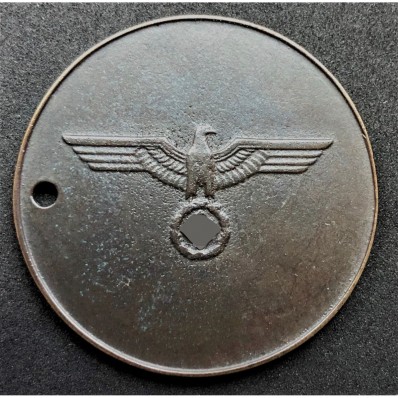Keine Artikel
Artikel wurde in den Korb gelegt
Sie haben 0 Artikel in Ihrem Warenkorb. Es gibt 1 Artikel in Ihrem Warenkorb.
Erkennungsmarke Der Geheime Feldpolizei
Neu
Die Geheime Feldpolizei (GFP) gehörte in der Zeit des Nationalsozialismus innerhalb der Wehrmacht zu den Ordnungstruppen. Erste GFP-Gruppen wurden kurz vor dem Polenfeldzug am 2. August 1939 als Teil des Feldheeres aufgestellt.
- Zufrieden oder erstattet: Wir garantieren 100% sicheren Schutz für Ihre Einkäufe
- Kostenlose Rücksendung: Senden Sie Ihre Bestellung innerhalb von 30 Tagen kostenlos zurück
- Sichere Zahlungen: Bezahlen Sie sicher online mit PayPal oder Kreditkarten

Mehr Infos
Die Geheime Feldpolizei (GFP) gehörte in der Zeit des Nationalsozialismus innerhalb der Wehrmacht zu den Ordnungstruppen. Erste GFP-Gruppen wurden kurz vor dem Polenfeldzug am 2. August 1939 als Teil des Feldheeres aufgestellt. Mit Beginn des Krieges gegen die Sowjetunion 1941 war der größte Teil dieser Ordnungstruppen zur Partisanenbekämpfung auf dem besetzten Territorium der Sowjetunion konzentriert. Für die unmittelbare militärische Ordnung im Einsatzgebiet waren die Feldgendarmerie und die Feldjägerkommandos verantwortlich, deren Angehörige in Anspielung auf die zur Uniform gehörende metallene Plakette mit der Aufschrift Feldgendarmerie oder Feldjägerkommando, die an einer Kette um den Hals getragen wurde, als Kettenhunde bezeichnet wurden.
Erkennungsmarken
- Deutschland
- Medaillen, Orden und Steckorden
- Kriegsabzeichen
- Erkennungsmarken
- Armschilde
- Schirmmützen und Hüte
- Mützenabzeichen, Helmabzeichen
- Auflagen für Kragenspiegel und Schulterklappen
- Kragenspiegel, Schulterklappen und Epauletten
- Armbänder
- Armelbander
- Koppelschlösser, Gürtel und Koppelriemen
- Knöpfe für Uniformen
- Stempel
- Ringkragen
- Ringe
- SS-Ehrenring aus 925er Silber - Sammlerset
- Fahnenspitzen
- Fahnen
- Dolche und Messer (Zierpflanzen)
- Feldmarschall Taktstöcke
- Munitionstaschen, Patronengürtel und -taschen
- Dienstuhren
- Präsentationsfälle
- Dokumente und Auszeichnungsschreiben
- Büsten, Adler, Feuerzeuge und Sonstiges
- Kroatische und Ustascha Militaria
- Entnazifizierte Artikel
- Gedenkhalsketten
- Ersatzteile, Kleinteile und Accessoires
- Italien
- Medallien und Orden
- Kriegsabzeichen
- Schilde und Blutplättchen
- Ringkragen
- Schirmmützen und Hüte
- Mützenabzeichen, Helmabzeichen
- Friese für Kragenspiegel
- Kragenspiegel, Schulterklappen und Epauletten
- Koppelschlösser und Schnallen
- Koppelriemen
- Knöpfe für Uniformen
- Ringe
- Fahnenspitzen
- Italienischer Widerstand
- Schlüsselringen
- Wappenschilde
- Dolche
- Fahnen
- Büsten und Adler
- Gadgets und Geschenke
- Gedenkhalsketten
- Deutsches Kaiserreich
- Sowjetunion
- Andere Länder






